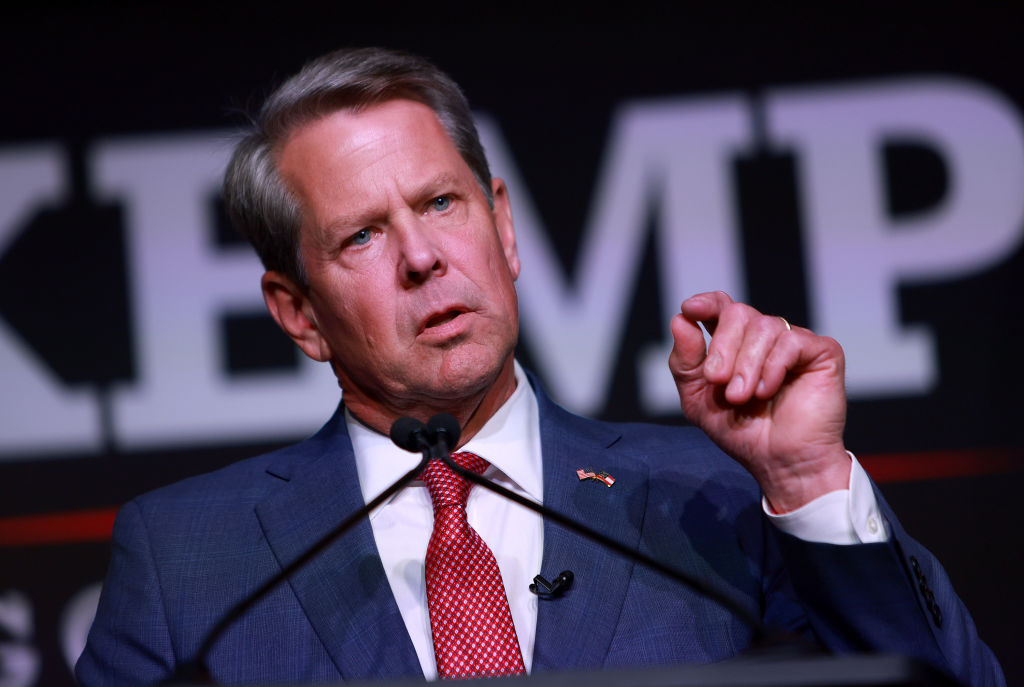What if I told you a successful southern Republican governor was poised to win a second term comfortably against a well-known Democrat in a key swing state?
What if I told you that governor had solid conservative credentials, from reopening early during the pandemic to staring down a liberal pressure campaign aimed at reversing one of his most controversial policies?
And what if I told you that governor had proven so skillful at maneuvering politically that he now rivals Donald Trump himself as the most powerful and influential Republican in his state?
You know who I’m talking about.
The one who’s about to flip a state won by Joe Biden two years ago solidly back into the Republican column.
On paper, Georgia Gov. Brian Kemp is a top-tier contender for the Republican presidential nomination. He has every policy and electoral credential one could want, in some respects more so than Ron DeSantis. Consider the following.
As of Friday, Kemp was north of 50 percent against Democrat Stacey Abrams in the RealClearPolitics polling average of their race. DeSantis was a hair under 50 percent against Democrat Charlie Crist in Florida. DeSantis’ lead is larger than Kemp’s, but relative to Trump’s performance in 2020 Kemp’s margin is more impressive. He leads Abrams by 5 points in a state Biden won by 0.2 percent. DeSantis leads by 7.8 points in a state Trump won by around 3.5 percent.
Kemp’s degree of difficulty is also higher. Crist and Abrams are each household names among their respective electorates, but Crist is past his prime and may be suspicious to some Democratic voters due to his Republican pedigree. Abrams is among the brightest progressive stars in the Democratic Party and commands a formidable turnout machine in Georgia that sent two members of her party to the Senate last year. Liberals are itching to see her ascend to statewide office and eventually become a national figure. Instead, thanks to Kemp, she’s likely to lose more decisively this year than she did the first time they faced each other in 2018.
And that’s in a state that’s been trending Democratic over time. In Florida, the trend is in the other direction and began before DeSantis was elected four years ago. The last time Florida elected a Democrat to the Senate was 2012. The last time it elected a Democratic governor was 1994.
As for policy, Kemp has an embarrassment of riches to share with 2024 primary voters. He moved to reopen businesses in Georgia so soon after the first COVID lockdowns in 2020 that Donald Trump rebuked him for it from the podium in the White House briefing room. He stood his ground during a Biden-endorsed liberal campaign to boycott Georgia after the “election reform” bill passed last year. Abortion in the state is now banned after six weeks thanks to a 2019 bill that Kemp signed into law, a stricter regime than the 15-week ban that DeSantis approved in Florida earlier this year.
Kemp even checked some of the boxes to appease anti-vaxxers after COVID vaccines became available, just to assure populists he was still on the team.
Sounds to me like the sort of a candidate a broad swath of national Republican voters can get behind. Yet when former House Speaker Paul Ryan was asked whom he thought the party might nominate in 2024, he offered this list.
Brian Kemp doesn’t so much as crack the top three? That can’t be right.
But it is right, for complicated reasons.
Well, not that complicated.
It’s a little complicated.
Jonathan Last considered Kemp’s presidential prospects or lack thereof in a post earlier this month, but we’ll all have to consider them if Kemp goes on to beat Abrams. And the bigger his margin is, the more considering we’ll need to do.
The margin of victory in Florida is hugely important to DeSantis’ chances in the 2024 primary, after all. DeSantis hopes to sell himself to Republicans as a more electable version of Trump, able to say that he finally broke the mold of tight elections in his state and defeated the Democrats decisively. Trump beat Biden there by 3 points; DeSantis wants to double or triple that spread to prove he can reach voters who were unreachable by the reigning Republican nominee.
But what if Kemp matches DeSantis’ margin in Georgia? It’s not hard to imagine both of them winning, say, 53-45. Were that to happen, by any measure Kemp’s performance would be the more arresting of the two. He would be the man who turned Georgia’s suburbs, and Georgia, red again. He’d have just as strong an electability pitch to 2024 primary voters as DeSantis, if not more so.
In theory.
In practice, he’s dead on arrival in a Republican presidential primary. We all know why.
I think Kemp’s showing in this year’s Georgia gubernatorial primary is one of the most impressive political performances in modern American history. Nominally it was him versus former Sen. David Perdue but realistically it was him versus Donald Trump, which in 2022 is like challenging Sun Myung Moon in a straw poll of Moonies. Nor was Trump’s interest in the race passive. With the exceptions of Liz Cheney and Mitch McConnell, there may be no Republican whom he’s attacked as frequently and as bitterly as Kemp.
Through a combination of skillfully ruthless string-pulling behind the scenes and immense discipline in refusing to criticize Trump, Kemp annihilated Perdue. A man written off as anathema to the MAGA majority before the campaign began ended up winning by more than 50 points. It was the biggest humiliation Donald Trump has suffered since he entered politics, and it distinguished Kemp from DeSantis in an important way. When asked about DeSantis in interviews, Trump unfailingly reminds the interviewer that he “made” DeSantis by endorsing him for governor in 2018. He can’t claim the same credit for Kemp anymore. Trump threw everything he had at ending Kemp’s career and failed miserably. Uniquely among Republican incumbents, the governor of Georgia slayed the dragon.
Which is the biggest reason, if not quite the only reason, that this very successful conservative politician is a nonstarter in 2024.
I imagine the modern Republican Party as a three-part coalition. On optimistic days I split that coalition 30/50/20 and on pessimistic days I split it 40/50/10. The 40 percent are hardcore MAGA, the voters who insist upon Trump or at least a convincing authoritarian simulacrum of him. The 10 percent are Trump skeptics, the pool in which The Dispatch fishes for readers. The 50 percent are the swing faction, the zombie partisans who’ll vote for whatever the party puts in front of them with varying degrees of enthusiasm. They might prefer a traditional Republican on the merits. But if forced to choose between being governed by an aspiring autocrat and a Democrat, they’ll take the autocrat every time.
Because they’re partisans and are desperate to hold the right’s coalition together, that 50 percent tends to acquiesce to whatever the 40 percent wants. And what the 40 percent wants in 2024, emphatically, is to not have a guy as their nominee who betrayed Trump by refusing to overturn the election in Georgia in 2020.
Now, the 50 percent could insist. Kemp could jump into the race, partisan Republicans could rally behind him, and he could sweep to the nomination. Essentially, the 50 percent could dare the MAGA 40 percent to boycott the general election due to hatred of Kemp, handing the presidency to Democrats.
They could. But they won’t. Because some of the MAGAs, egged on by Trump himself, really might walk. Asked whether they’re more loyal to Trump or more loyal to the party, fully a third of registered Republicans continue to say they’re more loyal to the man. If you’re a zombie partisan and your top priority, always and ever, is keeping Democrats out of power, daring a bunch of authoritarian cultists not to vote for a nominee whom the cult leader despises is quite the gamble.
To borrow Last’s formulation, DeSantis is halal because he remains a member of the Trump ummah in good standing. Kemp is haram. Policy, margins of victory, and all the rest are largely beside the point in that context. A nominee who’s a nonstarter for the 40 percent, guaranteeing Republican defeat, is necessarily a nonstarter for the 50 percent too.
You might be thinking, “Wait, if the 40/50/10 rule were true, shouldn’t Kemp have gotten smoked in the Georgia gubernatorial primary?” It’s true, his landslide in that race was the most audacious act of defying Republican political “gravity” of the Trump era. But Kemp had two great advantages there that wouldn’t carry over to a presidential primary. First, he was an incumbent governor whose policy record was well known to the primary electorate, certainly more so than his opponent’s was. Second, he was facing a dismal, uncharismatic challenger in David Perdue.
Neither of those things will be true in a national primary. Which brings us to the slightly more complicated reasons Kemp is DOA in 2024.
Even if we could convince the MAGA faction to let bygones be bygones about the 2020 election, Kemp would still have a problem. It’s not that he wouldn’t make a fine nominee. It’s that he pales by comparison to DeSantis in attributes valued by the populist base.
For starters, he’s no performer. He’s been governor for four years yet I’m hard-pressed to think of a single Brian Kemp sound bite that’s gone viral. Whereas DeSantis seems to crank out high-five material for conservative Twitter every time he’s in front of a mic.
Bratty lib-owning pugnacity is an essential part of being a Republican folk hero. Kemp eschews it, which must be a matter of temperament since it’s surely not an example of sound strategy. Why, he’s almost … dignified.
Not a man who’s going places in a post-Trump GOP.
Another advantage DeSantis has is being hated by the right people. Kemp does enjoy some credibility on that point thanks to the overheated liberal attacks on Georgia’s election law and doomsaying about the state’s early reopening during COVID. But DeSantis has eagerly cultivated a reputation as the media’s second-least favorite Republican, frequently attacking the press during Q&As for shoddy or biased coverage. They’ve given him good reason to resent them in some cases and he’s taken advantage. He’s been shrewd too in picking fights with some of the populist right’s bêtes noires, like Big Tech and “woke corporations.” The fact that prominent liberals like Gavin Newsom have singled him out as a menace feathers his cap further.
Unlike Kemp, he’s even being criminally investigated. You’re no one in conservative populism unless you’re facing potential indictment.
DeSantis is hated by the right people. Kemp, if anything, is hated by the wrong people. He has a few detractors on the left, sure, but his most outspoken detractor is the leader of the Republican Party. Ask Donald Trump and Joe Biden what they think of Kemp and the former would complain bitterly about his “disloyalty” while the latter would probably compliment him for having upheld the law in 2020.
Again, not a way to get ahead in a party whose stars behave like this.
Finally, there’s ideology. Kemp is every inch a conservative but not one who’d seem out of place in the Romneyfied GOP of 2012. He hasn’t (d)evolved. DeSantis is more in touch with the authoritarian zeitgeist, as summarized here by Last.
DeSantis offers Trumpism in all its forms:
• The abandonment of conservative free-market economics in favor of state meddling.
• The primacy of performative politics over actual policy.
• The elevation of political debate to cultural warfare.
• The eagerness to use the power of the state against opponents and members of out-groups.
Some of the language there is too strong (“abandonment”) but it’s true that DeSantis is willing to use state power to pressure or punish the right’s enemies to a degree that would have made traditional Republicans uncomfortable. He banned private businesses from requiring vaccine passports, snookered asylum-seekers onto a plane so that he could dump them in a ritzy liberal community, and stripped Disney of its special improvement district in Florida because the company criticized a law he’d signed. He’s proved that he’s willing to be ruthless in using his office to wage cultural warfare on the left.
The one time Brian Kemp was asked to be ruthless on behalf of the right, he declined. He might not even campaign for Herschel Walker in this year’s Senate race in Georgia. DeSantis, meanwhile, is stumping for authoritarian-approved cranks like Kari Lake.
That’s why Kemp’s fine record as governor meant a lot in his primary against Perdue but won’t mean much in a presidential primary in 2024. When you vote for governor, you’re choosing which policies you want to be governed by. When you vote for president, you’re choosing a culture-war pope. There’s no populist argument for Kemp over DeSantis on that score.
Remember, there are only two kinds of Republicans in the new right’s cosmology, suckers and fighters. If you’re not one, you’re the other. Kemp had his chance in 2020 to prove he’s a “fighter” and did the right thing instead. His career will never be the same.









Please note that we at The Dispatch hold ourselves, our work, and our commenters to a higher standard than other places on the internet. We welcome comments that foster genuine debate or discussion—including comments critical of us or our work—but responses that include ad hominem attacks on fellow Dispatch members or are intended to stoke fear and anger may be moderated.
You are currently using a limited time guest pass and do not have access to commenting. Consider subscribing to join the conversation.
With your membership, you only have the ability to comment on The Morning Dispatch articles. Consider upgrading to join the conversation everywhere.